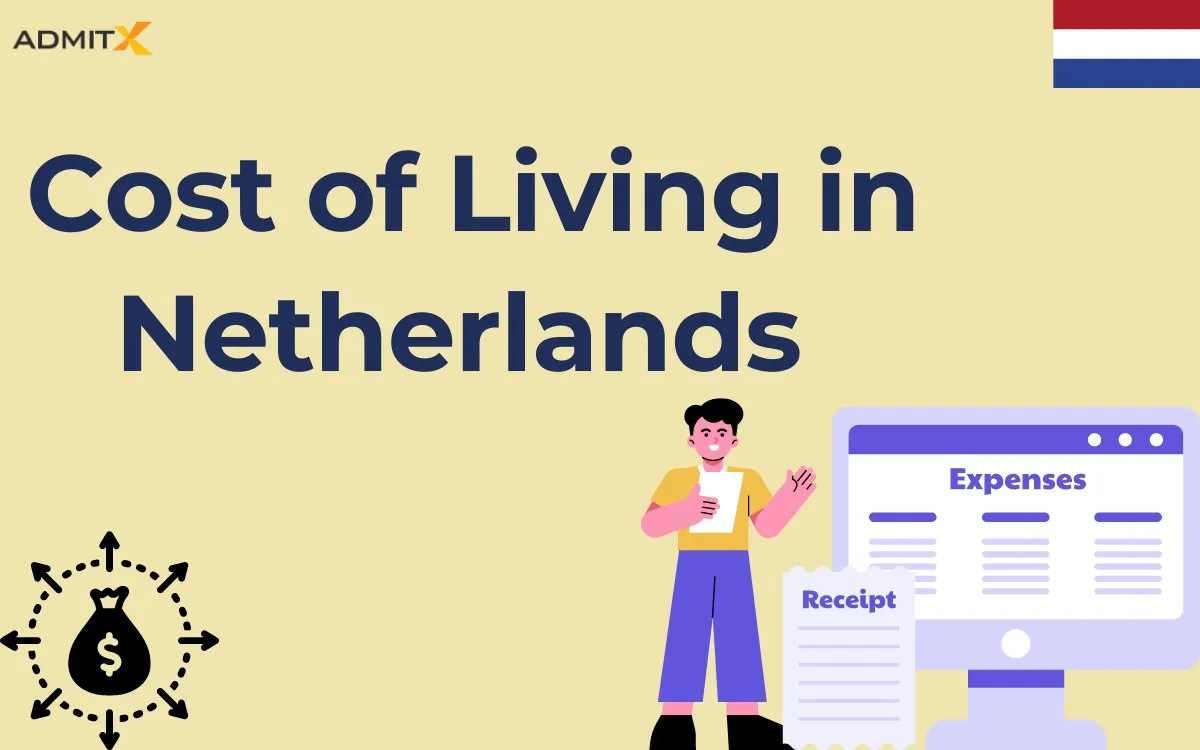
Cost of Living in Netherlands for Indian Students
Estimating the Cost of living before going to any country is essential for every student as it makes them aware of upcoming expenses.
The Cost of living generally includes the Cost of accommodation and meals. Transportation, utility services, etc., for which one should prepare accordingly to avoid chaotic situations.
In this blog, we have presented a detailed description of living expenses for Indian students in the Netherlands, including the average Cost of living in various Dutch countries and the significant components of living expenses mentioned above.
- Living Expenses in Netherlands: Introduction
- Average Living Expenses in Netherlands for Indian Students
- Affordable Cities in Netherlands
- Living Expenses in Netherlands: Cost of Accommodation
- Average Cost of Study in Netherlands for International Students
- Health Insurance for Indian Students in Netherlands
- Living Expenses in Netherlands: Top Cities
- Tips to Cut Living Expenses in Netherlands
- Conclusion
- FAQs
Living Expenses in Netherlands: Introduction
Living expenses, or the cost of living, are the finances required to sustain and maintain living standards. Examples include house rent, food, transportation, clothing, utility bills like electricity, gas, phone bills, laundry, etc. Going to any country for higher studies involves many expenses, which students should know.
Here, we will briefly discuss the cost of living in the Netherlands, including average expenses, essential services such as accommodation, meals, transportation, health insurance, tips to reduce unnecessary costs, and more.
Average Living Expenses in Netherlands for Indian Students
Depending on the city that pursued the course, local taxes, etc. the living expenses in Netherlands can be estimated. Estimating the cost of living includes calculating the total cost of study, such as tuition fees and other academic expenses, accommodation, meals, transportation, personal leisure, utility bills, such as electricity, water, internet bills, emergency funds, etc. This should be done before departing for the Dutch country so that appropriate arrangements can be made without chaos.
An Indian student should make a monthly budget of between 800 and 1450 Euros (INR 72,000 to 1.25 Lakh) to sustain themselves comfortably.
Apart from these costs, tuition fees for pursuing courses are also considered separately, subject to annual revision. Hence, one should make their financial preparations in advance.
Below is the table that enlists the general breakdown of the cost of living in Netherlands for Indian students.
| Expenses | Estimated Expenses (per month) |
|---|---|
| Accommodation | 900-1,500 CHF (INR 84,000-1.40 Lakh) |
| Food | 500-900 CHF (INR 46,000-84,000) |
| Transportation | 80-150 CHF (INR 7,500-14,023) |
| Amusement/Leisure | 100-300 CHF (INR 9,000-28,000) |
| Utilities Bills (Electricity, Water, Phone bills, etc.) | 150-250 CHF (INR 14,000-23,000) |
| Total Expenses | 1730-3050 CHF (INR 1.62 Lakh-2.86 Lakh) |
Also read – How to Find the Perfect Study Abroad Program
Affordable Cities in Netherlands
We have listed below the affordable cities in Netherlands for Indian students and their average monthly cost of living.
| Cities | Average Cost of Living (per month) |
|---|---|
| The Hague | €800-1300 (INR 72,000-1 Lakh) |
| Amsterdam | €1000-1500 (INR 90,000-1 Lakh) |
| Delft | €700-1100 (INR 70,000-1 Lakh) |
| Utrecht | €800-1400 (INR 72,000-1 Lakh) |
| Rotterdam | €770-1250 (INR 71,000-1 Lakh) |
| Tilburg | €715-1150 (INR 73,000-1 Lakh) |
Living Expenses in Netherlands: Cost of Accommodation
Accommodation costs in the Netherlands may vary according to location, accommodation type, size of house requirements, etc.
In the Netherlands, international students usually don’t prefer on-campus accommodation but live in student houses across the city.
Even if there is a shortage or non-availability of on-campus accommodation, applicants must stay in touch with the university where they have been enrolled. Institutes play a significant role in providing suitable accommodation to incoming students without any hustle. This prevents students from falling into the trap of scammers, unauthorised persons, or agencies. It is the wisest approach to start searching for accommodation when the student gets an acceptance letter from the university.
Below, we present a table to showcase the average cost of accommodation off-campus.
| Type of Accommodation | Cost of Accommodation (per month) |
|---|---|
| Private owned Homes | €800-1000 (INR 72,000-90,000) |
| Shared Apartments | €500-750 (INR 45,000-63,000) |
| Student Houses | €400-600 (INR 36,000-54,000) |
Average Cost of Study in Netherlands for International Students
One of the primary reasons why Indian students choose the Netherlands as a study destination is that Dutch universities offer a diverse range of academic programs at very cost-effective fees, leading to certification in bachelor’s, master’s and PhD courses.
The cost of study in Netherlands for international students depends on the type of course and university they choose.
However, the average tuition fee in Netherlands for international students ranges from 2,000-30,000 Euros or INR 1-27 Lakh per year.
Dutch universities often grant scholarships to international students to reduce their fee burden and, thereby, the net cost of living in the Netherlands.
Below, we have tabulated the average tuition fees for international students in Netherlands.
| University | QS World Rankings (2024) | Tuition Fees (Per Year) |
|---|---|---|
| Delft University of Technology | 47 | €16,705-20,560 |
| University of Amsterdam | 53 | €2,503-27,390 |
| Utrecht University | 107 | €18,332-20,043 |
| Eindhoven University of Technology | 124 | €2,314-17,800 |
| Leiden University | 126 | €19,600-21,200 |
| University of Groningen | 139 | €2,314-2,530 |
| Wageningen University & Research | 151 | €16,400-19,600 |
| Erasmus University Rotterdam | 176 | €9,000-29,000 |
| Vrije Universiteit Amsterdam | 207 | €2,530-24,310 |
| University of Twente | 210 | €9,625-14,250 |
Also read – Masters Abroad Top Courses Universities
Health Insurance for Indian Students in Netherlands
Indian students who study or work in the Netherlands are legally required to have health insurance.
However, they cannot avail themselves of Dutch public health insurance benefits if they reside in the country only for study purposes. They are allowed only when they have a part-time job.
Suppose an Indian student is not engaged in part-time employment. In that case, they must have regular health insurance from India with enough coverage or take out private health insurance there.
To avail of Dutch public health insurance benefits, international students must contact the Central Administration Office (CAK), which will register them with an insurer and withhold the premium from their salary. The standard premium, which is 135 Euros or INR 12,216 per month, will be withheld from the pay.
Living Expenses in Netherlands: Top Cities
The following is an overview of the average cost of living in major cities in the Netherlands. It includes accommodation, transportation, meals, and the cost of tourist attractions.
| City | Accommodation (per month) | Transportation (per month) | Meals (per month) | Attractions (per month) | Total |
|---|---|---|---|---|---|
| The Hague | 400-800 EUR (INR 36,000-72,000) | 50-70 EUR (INR 4,000-6,000) | 150-170 EUR (INR 13,000-15,000) | 150-200 EUR (INR 13,000-17,000) | 750-1240 EUR (INR 67,000-1 Lakh) |
| Amsterdam | 500-1000 EUR (INR 45,000-90,000) | 70-100 EUR (INR 6,000-9,000) | 200-250 EUR (INR 13,000-16,000) | 200-330 EUR (INR 13,000-29,000) | 970-1680 EUR (INR 87,000-1 Lakh) |
| Delft | 400-700 EUR (INR 36,000-63,000) | 40-60 EUR (INR 3,000-5,000) | 70-150 EUR (INR 6,000-13,000) | 100-200 EUR (INR 9,000-16,000) | 610-1110 EUR (INR 54,000-99,000) |
| Utrecht | 500-1100 EUR (INR 45,000-99,000) | 50-120 EUR (INR 3,000-10,000) | 100-150 EUR (INR 9,000-13,000) | 50-100 EUR (INR 4,000-9,000) | 700-1470 EUR (INR 67,000-1 Lakh) |
| Rotterdam | 400-700 EUR (INR 36,000-63,000) | 70-100 EUR (INR 6,000-9,000) | 50-100 EUR (INR 4,000-9,000) | 50-150 EUR (INR 4,000-10,000) | 570-1050 EUR (INR 51,000-94,000) |
Tips to Cut Living Expenses in Netherlands
Pursuing higher study programs in foreign lands such as the Netherlands can be quite expensive for some Indian students, especially if they are unable to manage their finances efficiently.
Below are some ways to reduce the unnecessary expenses of students starting to live outside India.
Shared Accommodation
Rather than opting for a personal room, students must opt for shared accommodation to reduce their accommodation costs.
Public Transportation
Using public transport rather than buying cars or motorbikes is an ideal way to save transportation costs. Purchasing a bicycle is also an excellent and cost-effective way to commute, save fuel, and contribute to environmental conservation strategies.
Budgeting and Tracking Expenses
Preparing a budget on a weekly or monthly basis can help estimate expenditure costs. Students can also track and manage their expenses through this process.
Part-time Work
Exploring part-time job opportunities can help students manage expenses and foster the necessary skills for future employment.
Conclusion
To conclude, understanding and maintaining a cost-effective approach to life is necessary for students if they go outside their country to pursue study or work. This is so because the living expenses are relatively high in foreign countries, including the Netherlands, and finding ways to manage them effectively is required.
The average living expenses in the Netherlands can vary depending on the locality, lifestyle preferences, local taxes, etc.
Undoubtedly, the Netherlands is a beautiful and economical country to pursue higher education, but it also comes with specific financial challenges for international students if they are freshers.
FAQs
How to find part-time jobs in Netherlands to cut living expenses?
Finding part-time employment in Netherlands while pursuing higher education is not difficult. Students must contact local recruitment agencies or visit LinkedIn to find suitable employment opportunities.
What is the average salary for part-time jobs in Netherlands?
The average salary depends on several factors, such as locality, experience, employer, etc. However, the average salary for part-time employment in the Netherlands ranges from 10 Euros to 30 Euros per hour (INR 900-9,000).
How much is the bank balance required for a Netherlands student visa?
An international student who applies to study in Dutch universities must have at least €850 per month for living expenses and tuition fees for the course. They must prove they have sufficient financial means to support themselves during their studies.
If you are an aspirant looking to study at your dream university, book an appointment with AdmitX today and start your applications early to avail yourself of all the benefits.








